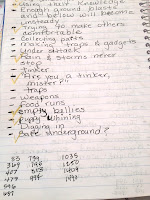While previously a Microsoft Excel spreadsheet and a Microsoft Word table listing chapters served as tracking devices for my writing, now that I am heavy-duty first drafting, a printed sheet from a Word calendar template and a notepad serve as my guideposts for writing goals and tracking and for scene direction. While diving into first drafting, I need simple.
I jot down what chapters I plan to write when for the entire month, leaving a couple of days off per week to accommodate non-writing time and potential appointments, then make adjustments at the end of each day. I check off completed chapters, and then use another color of ink to adjust chapter numbers if a chapter happens to roll over to the next day. Simple.
![]() For each scene, I hand write (well print, since my penmanship tends to lack readability) a bulleted list of what might possibly happen next in the scene, potential happenings, possible conflicts, dialogue snippets. At the bottom of the page, I note word count when I pause to reflect on what's next in the scene. (Again, simple.)
For each scene, I hand write (well print, since my penmanship tends to lack readability) a bulleted list of what might possibly happen next in the scene, potential happenings, possible conflicts, dialogue snippets. At the bottom of the page, I note word count when I pause to reflect on what's next in the scene. (Again, simple.)
The calendar and note page are nothing fancy, and with the exception of the examples included in this post, are for my eyes only.
The calendar gets messy, but I am able to discern where I stand and what adjustments I might need to make to the schedule. My notes are sloppy, yet I get an idea and gist of what direction the chapter might go or needs to take.
The information on both pages is flexible, ever changing, and helps me keep track and view the first draft status and where the next chapter is possibly headed. Both sit on my writing table for easy referencing. Nothing fancy or complicated, yet they work. Oh so simple!
Did I happen to mention that I love and appreciate simple?
I jot down what chapters I plan to write when for the entire month, leaving a couple of days off per week to accommodate non-writing time and potential appointments, then make adjustments at the end of each day. I check off completed chapters, and then use another color of ink to adjust chapter numbers if a chapter happens to roll over to the next day. Simple.
 For each scene, I hand write (well print, since my penmanship tends to lack readability) a bulleted list of what might possibly happen next in the scene, potential happenings, possible conflicts, dialogue snippets. At the bottom of the page, I note word count when I pause to reflect on what's next in the scene. (Again, simple.)
For each scene, I hand write (well print, since my penmanship tends to lack readability) a bulleted list of what might possibly happen next in the scene, potential happenings, possible conflicts, dialogue snippets. At the bottom of the page, I note word count when I pause to reflect on what's next in the scene. (Again, simple.)The calendar and note page are nothing fancy, and with the exception of the examples included in this post, are for my eyes only.
The calendar gets messy, but I am able to discern where I stand and what adjustments I might need to make to the schedule. My notes are sloppy, yet I get an idea and gist of what direction the chapter might go or needs to take.
The information on both pages is flexible, ever changing, and helps me keep track and view the first draft status and where the next chapter is possibly headed. Both sit on my writing table for easy referencing. Nothing fancy or complicated, yet they work. Oh so simple!
Did I happen to mention that I love and appreciate simple?